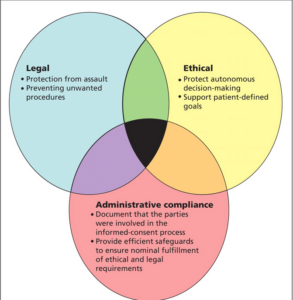Codes of Practice and Informed Consent
 When it comes to nursing, patient care is a top priority. In nursing research, however, the quality and reliability of the research are also crucial.
When it comes to nursing, patient care is a top priority. In nursing research, however, the quality and reliability of the research are also crucial.
Clinical research is vital for medical progress. However, history has shown that researchers haven’t always treated participants fairly, especially those from marginalized groups like prisoners, people with disabilities, or people of color.
This highlights the importance of nursing ethics and patient rights in research.
Nurses and those responsible for patient care often face “moral injury,” which is distress caused by witnessing or participating in unethical practices. In 1985, the American Nurses Association (ANA) updated its guidelines on Human Rights in Research to help nurses understand their duty to protect participants and their own rights. These guidelines align with the ANA’s Code of Ethics for Nurses, equipping nurses to make ethical decisions, safeguard participants, and prevent moral distress.

Struggling to meet your deadline?
Get your assignment on Codes of Practice and Informed Consent done by certified MDs and PhDs in the USA. ORDER NOW!
How to Record Nursing Continuing Education Units (CEUs)
This page explains ethical codes and informed consent in nursing and how to apply them.
Nursing Responsibilities and Ethical Challenges
Nurses involved in or supporting research encounter ethical dilemmas in nursing when new procedures are used without predictable outcomes. They must decide the right course of action when a technique may not help patients and could cause harm. Understanding clinical research ethics is essential for making these decisions.
Nurses aren’t alone in this. Organizations conducting research usually have groups to safeguard the rights of participants and researchers, which aligns with research ethics guidelines.
Informed Consent for Nurses
The idea of “informed consent” empowers the individual most affected by the decision. For nurses in research settings, they should:
- Know if they’ll provide care in a double-blind study (where neither patient nor researcher knows the treatment).
- Be informed if they’ll collect research data.
- Have the choice to opt out of research if they weren’t informed beforehand.
- Understand any potential risks from research and how to identify and handle them.
Informed Consent for Participants
Participants must also understand risks involved in a study. Nurses engaged in research must comprehend patient informed consent and report if a participant didn’t fully consent to any part of a study. This applies to all participants, but nurses must be especially vigilant with those vulnerable populations in research who are at risk of exploitation or incapable of giving informed consent.
Human Rights
Researchers must protect participants from harm. Though all research holds some risk, it should be minimized and proportionate to potential benefits and knowledge gained. Participants can withdraw from research without repercussions. Nurses must uphold privacy and dignity, ensuring no harm during or after publication. Participants must know what they’re sharing and how it’ll be used.
Participants
Participants aren’t only patients; they include donors, survey respondents, and volunteers. Nurses must safeguard rights, especially of prisoners, students, mental health facility residents, and military personnel. Minors should participate with parental consent. Generally, children and those with limited freedom shouldn’t participate unless they or similar groups benefit.
The Nurse’s Guide to LinkedIn and Networking
Supporting research enhances nursing practice and patient care, benefiting society. Nurses are obligated to promote scientific knowledge that improves their practice. This is part of nursing research best practices.
For more details on nurses’ research responsibilities, Provision 7 of the Code of Ethics for Nurses explains the moral duty to advance nursing knowledge.
Additional Resources
The Department of Health and Human Services’ Office for Human Research Protections offers resources and online education. The University of Pittsburgh provides resources for protecting participants, including those with low literacy.
Sources
Human rights guidelines for nurses in clinical and other research. (1985). American Nurses Association
Codes of ethics for nurses. (2015). American Nurses Association
Summary
In nursing, patient care is paramount, but ethical practices in nursing research are equally vital. Historical injustices in clinical research have highlighted the need for robust ethical guidelines, particularly to protect marginalized groups. The American Nurses Association (ANA) emphasizes the importance of informed consent and ethical decision-making for nurses. This ensures participants’ rights are upheld while also protecting nurses from “moral injury,” a distress caused by witnessing unethical practices.
Nurses face ethical dilemmas, especially with new procedures that might not guarantee positive outcomes. They must navigate these challenges while adhering to ethical standards set by the ANA. The concept of informed consent is crucial; it allows patients to understand risks and make informed choices about their participation in studies. Nurses must also be aware of their responsibilities, ensuring that participants, especially vulnerable populations, are adequately informed and protected.
The principles of human rights must guide nursing research. Participants should never be harmed, and their privacy must be respected throughout the research process. Moreover, participants have the right to withdraw from studies without facing negative consequences. Nurses play a key role in safeguarding these rights, particularly for groups at risk of exploitation, such as prisoners or minors.
Conclusion
The ethical framework surrounding nursing research is essential for advancing the profession and ensuring patient safety. By adhering to the ANA’s guidelines, nurses can contribute to meaningful scientific knowledge while protecting participants’ rights. This commitment to ethics not only enhances nursing practice but also fosters trust within the healthcare system. For those seeking in-depth understanding or assistance, resources for online nursing papers, nursing assignments, and custom nursing papers can provide valuable insights into the ethical responsibilities in nursing research. Emphasizing best practices in nursing essays and research contributes significantly to the field, ultimately benefiting society as a whole.

Dont wait until the last minute.
Provide your requirements and let our native nursing writers deliver your assignments ASAP.

